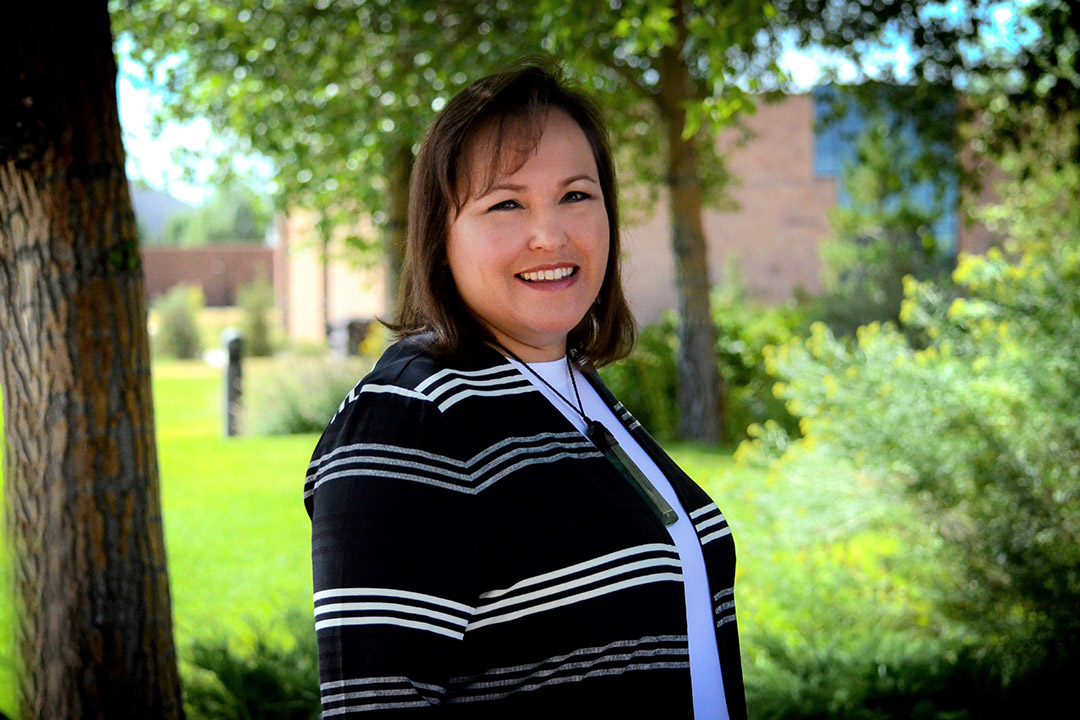
New vice-dean Indigenous ready to redefine the role
It wasn’t the typical way to start a new job.
By Shannon BoklaschukWhen Dr. Angela Jaime (PhD) began working at the University of Saskatchewan (USask) last month, she had just moved from the U.S. to Canada with her two sons, amid the global COVID-19 pandemic.
The family self-isolated at their Saskatoon home for 14 days upon arrival, meaning they couldn’t go out to immediately explore their new city. And, with the continued closure of the USask campus due to the coronavirus, Jaime had to become acquainted with her USask colleagues through online, rather than face-to-face, meetings.
“Moving to another country during COVID-19 was a challenge. USask does a wonderful job of supporting its immigrant families with legal and relocation specialists. While the process was overwhelming, I had great support,” said Jaime, who officially began her five-year term as vice-dean Indigenous in USask’s College of Arts and Science on July 1.
“Working remotely, while necessary, has considerable challenges. It’s difficult to feel as connected to my new colleagues when we are all in different locations. Working from home does offer me the opportunity to help my sons make the transition a bit better and settle into our new home.”
A member of the Pit River and Valley Maidu Tribes of northern California, Jaime earned her Master of Arts degree at San Francisco State University and her PhD at Purdue University. Prior to coming to USask, she was a professor in the School of Culture, Gender and Social Justice at the University of Wyoming.
When asked what attracted her to USask, Jaime noted that the university and Canada “have some amazing initiatives happening with Indigenous people.”
“The vice-dean Indigenous role is not a position you find in the States,” she said. “The opportunity to be a part of Truth and Reconciliation for Indigenous people in an academic situation was a major draw to the job posting.”
Jaime took over the position of vice-dean Indigenous from Dr. Dirk de Boer (PhD), a faculty member in the Department of Geography and Planning, who had served in the role in an interim capacity since 2018. Jaime will now be responsible for all matters relating to Indigenous engagement within the college, including the implementation of Indigenous-related strategies outlined in the college’s plan to 2025.
One of the goals in the plan is to establish a Centre for Indigenous Scholarship—something Jaime is particularly interested in. The research centre, driven by community input, will support all aspects of Indigenizing research, scholarly and artistic work in the college. Other goals are connected to Indigenizing and decolonizing the college, Indigenous student success, faculty and staff recruitment and success, and strengthening partnerships with the community.
“Some of my initial goals and aspirations for this role are what attracted me to this position,” said Jaime. “I am excited about the creation of the Centre for Indigenous Scholarship and the discussions around recruitment and retention of Indigenous students, staff and faculty.”
In addition to her role as vice-dean Indigenous, Jaime has an academic appointment in the Department of Indigenous Studies. To date, her research and scholarship has focused on stereotypes and generalizations of race, culture, and gender within education.
“Indigenous studies is an interdisciplinary field; this is one of the many virtues that attracted me as a student. I enjoy the flexibility to include aspects of many fields into the context of my research,” said Jaime.
“My most recent work focuses on the experience and story of our Indigenous people. I work with autoethnography and narrative inquiry in relation to the experience of Indigenous women who are mothers, academics, and community members. I have a lot to learn about the Indigenous communities here in Saskatchewan and Canada. I intend to listen to the Elders and community and let them help direct where my research might go next.
“I want to encourage people in the Indigenous community and key stakeholders to feel comfortable reaching out to me to help me understand how I can support them and those they serve.”
Jaime and her sons are now settling into their new home and have had the opportunity to explore the city, including tasting some local cuisine. She describes Saskatoon, which is situated on Treaty Six Territory and the Homeland of the Métis, as “a beautiful place.”
“There are a lot more amenities here than where we lived in Wyoming. The river and rolling grasslands are gorgeous,” Jaime said.
“I am impressed and thankful for the warm welcome by those I have met and who have reached out to me since my boys and I arrived. I have had several meetings with colleagues and feel encouraged and excited about redefining this position for the college and myself.”

